A few days ago I ran into a question, in a social network, that inspired me these lines: "How many things did they teach you in school about your homeland history that you later realized were not entirely true?" Here goes my answer:
Sure it's a long list!
The teaching of History is full, on one side, of “official” myths and, on the other, of the natural historian’s subjectivites. In Venezuela, until nothing ago, cultural marxism had an important penetration in universities and among academic circles (it’s worth it to check the Welcoming Manifesto to Fidel Castro in 1989), so marxist historiography did predominate around History studies, building (or encouraging and reinforcing ) an architecture of myths and historical fallacies. I'll try to comment some of them chronologically:
1. Black Legend
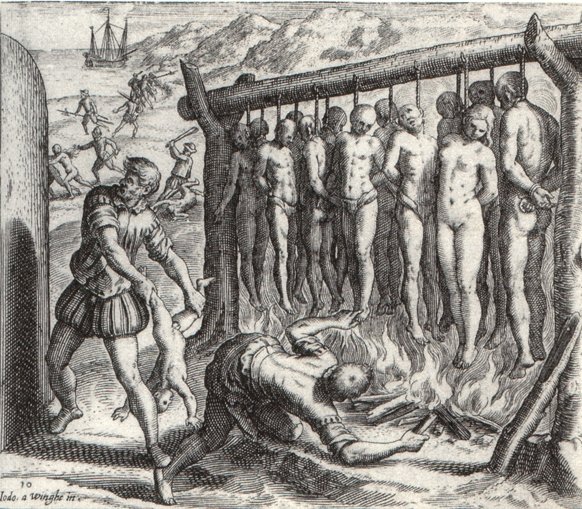
Drawing by De Bry appeared on "Brevísima", a text by Bartolomé de Las Casas.
Its american versión, was extended by Liberators as justification of Indpendence's War (and if Bolívar said it, then who questions it?). Black Legend was elaborated by protestant powers against rising Spanish Empire (although some researchers place its origin in medieval Italy) and, in the american case, it focuses mainly in colonization of Indias, waving some flags:
Columbus brought in his caravelas the worst possible people: rapists, murderers, ex convicts… False! With Columbus came a bunch of adventurers, warriors, man willing to enrich and, basically, young aspirants to honour and glory. Professor Eliseo López, by the way, published an exhaustive investigation, in which he lists all the spanish people who came to Venezuela during the sixteenth, seventeenth and eighteenth centuries.
Colonization was all about death and indigenous extinction. False. If in one hand they brought the sword, as indeed it was, in the other one they brought Bible: conquering over here —with violence, inevitably— and, evangelizing over there. There was, logically, violence: it's natural that natives defended their territories and, of course, there did exist brutality on the part of some conquerors. But it's worth it, for example, to remember the guideline of Queen Isabel I, La Católica not to enslave american indians (because of their condition of subjects ofthe Crown) or, also, Bula Sublimis Deus, in which the very same Pope of Rome recognizes the humanity (rank of human being, with soul) of indigenous people. And, of course!, Fray Bartolomé de Las Casas, Defender of the Indians. And I must clarify: it's undeniable that there was a very high indigenous mortality (beetwen war and diseases brought from Europe), or that american territory was tremendously sacked and that there was cases of brutality (impalements, tortures, drownings), but historical reality must be differentiated from mere antihispanic propaganda.
Venezuela was a poor, por province all across Colonial times. Not false: super false! At the end of XVIII century, Province of Venezuela managed to stop depending on cocoa, thanks to coffe and indigo harvests that gave the economy an important boost. It was this, in some way, that facilitated the conformation of an enlightened class in Caracas, that would end up guiding he Independence process. Baron Humboldt describes it in his Travel to the Equinoctial Regions of the New Continent: “In several families I have found enthusiasm for instruction, knowledge of models of french and italian literature, and a decided predilection for music…”. Does not seem like a description of a depressed province.
2. Independence was a war beetwen venezuelans and spanish people
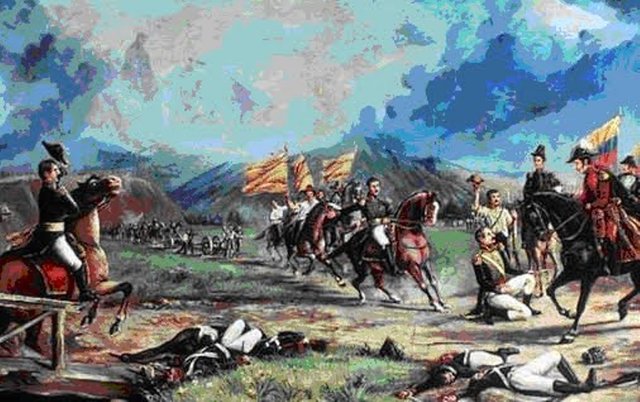
La Victoria battle, february 1814. Taken from: https://sites.google.com/site/venezuelaplus/efemerides/batalla-de-la-victoria.
Truth is that, at its beginnings, Independence War was a major civil war. The first royal armies were formed by venezuelans who reacted against Revolution and in favor of the restitution of Monarchy. Eventually, of course, some contigents came from metropolis; but initially, pardos (half bloods) and venezuelan eslaves rose up against the revolutionaries, more as a response to their oppressors (whites that were now guiding the Independence) that as support of the ancien régime.
3. Francisco de Miranda betrayed the Republic when capitulating to Monteverde
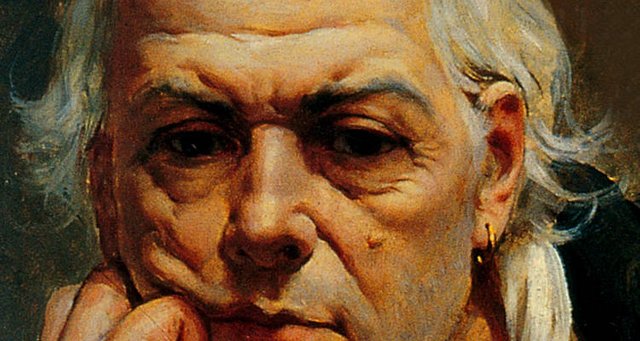
Fragment of “Miranda en La Carraca”, by Tito Salas. Taken from: http://www.notiactual.com/200-anos-la-muerte-m/.
Not only false, but outrageous. The man with the best military experience in patriot army was, by far, don Francisco de Miranda (who else fought in the three big revolutions?). Being the leader of Liberator Army during the First Republic, he finds himself forced to capitulate to Domingo de Monteverde, royalist leader, when Puerto Cabello Place (warehouse full of accoutrements and gunpowder) is taken by Monteverde. Added to fallen patriots and impossibility of continuing armed defense, Miranda signs the armistice and ends up captured by his own comrades in arms and handed over to royalists, who arrested and sent him to Spain. And it's right here where the myth is born: it was Simón Bolívar who sold Miranda out! So, in beware of Bolivarianism (another one of the myths), they've tried to justify the treason, accusing Miranda himself as traitor... Well did The Most Universal American say while being detained: Bochinche, bochinche, these people don’t know to do but bochinche. [I've had a hard time trying to translate "Bochinche". There's a good approach over here]. By the way: the one in charge of Puerto Cabello, was Bolívar.
Now, a quantum leap to half the XX century:
4. Pérez Jiménez did build Venezuela
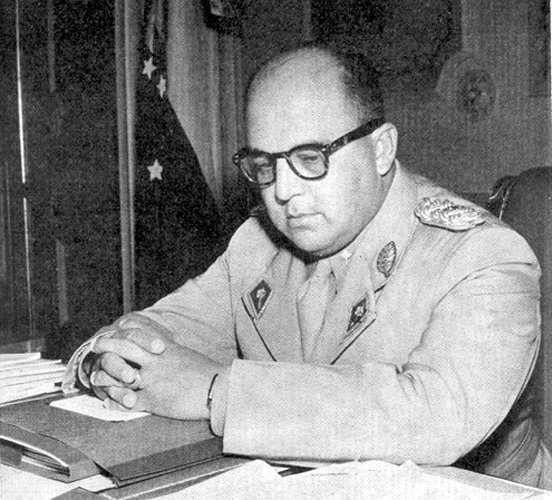
Marcos Pérez Jiménez, venezuelan dictator. Taken from: https://sites.google.com/site/derechosdelibertad/marcos-perez-jimenez/biografia.
Between 1948 and 1958 Venezuela was governed by a military dictatorship that, after a fraudulent election in 1952, was headed by Marcos Pérez Jiménez. In this regard, it has been tried to extol the dictatorship and the dictator himself, attributing him the urbanization and modernization of the country. Certainly, the government of Pérez Jiménez built major works using the technique of reinforced concrete —a symbol of perezjimenismo— but the truth is that the modernization of the country had begun in 1936, after the death of the dictator Juan Vicente Gómez, with the promotion to power of Eleazar López Contreras. In addition, to unmask the myth: during Venezuelan civil democracy (1958-1998) physical, material and spiritual progress of society left perezjimenismo like a baby. And in case the comparison seems unfair (forty years against ten), it is worth limiting: only the governments of Rómulo Betancourt and Raúl Leoni (1959-1969) built much, but much more than the military dictatorship. In any case, dictatorship is dictatorship, and without freedom there is no progress. And beyond what he could do or failed to do, Perezjimenismo was an undesirable, murderous, and torturing regime.
But back to the nineteenth century, to highlight the most important myth of Venezuelan history:
5. Bolivarianism
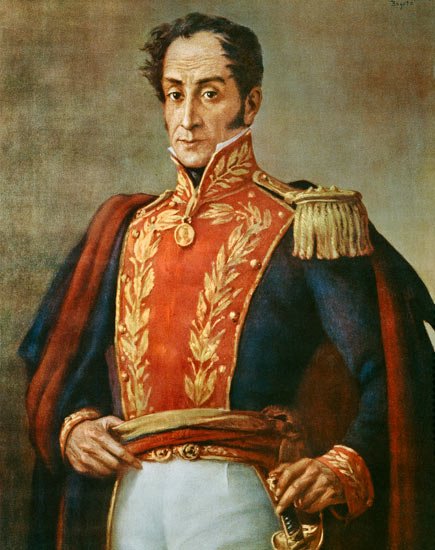
Simón Bolívar, el Libertador.
Trying to approach it in a few lines is a true daring on my part, but the general idea is the following: it has been tried, in Venezuela, to deify the Liberator Simón Bolívar. In a mythological sense, make it the Zeus of the Venezuelan Olympus. The foundation of the Cult to Bolívar takes place during the Presidency of General Antonio Guzmán Blanco, at the end of the 19th century. The truth, I believe, Guzmán seeks to use the figure of Bolivar as an element of national unification, which is understandable and positive (in general, the national iconography we owe it to Guzmán and his efforts to build a Venezuelan collective imaginary), but the Bolivarianism degenerated into an outrageous myth: Bolívar is father, mother, brother, saint, student, military, civilian, good lover, role model... and, above all, an unquestionable man. And if the Liberator was a man dedicated to the struggle for the freedom of the American provinces, he was also an absolute megalomaniac ready to become (and willing to do so) in the american Napoleon. It is enough to review the founding Constitution of Bolivia (and the very name of the country!): Bolivar would be President for a quasi-hereditary presidency. It was not, Bolivar, a democrat. By the way, it should be noted: if Bolívar was "an unquestionable man", anything done, justified in Bolívar, is good by definition... and you will imagine how much the tyrants have done with the Bolivarian myth and rhetoric.
I could continue listing, but these are some of the most important in Venezuela. Of course, the teaching of history, here and everywhere, is full of myths and interests, but... come on!, in the twentyfirst century and with access to the Internet, it is also our task to change that.
Now I'm the one who asks:
Would you add some myth of the History of Venezuela?
And you, what myths of the History of your country do you know?
Read you later, friends. ✌
To read this post in spanish I invite you to:
https://steemit.com/spanish/@jesusvalerio/5-grandes-mitos-de-la-historia-de-venezuela